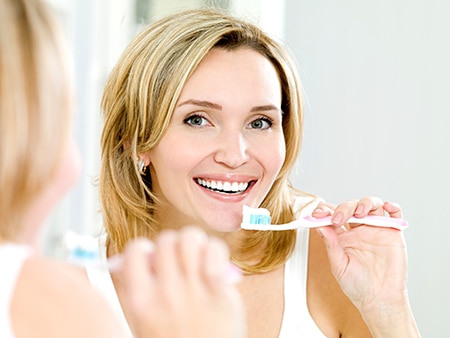Congratulations on this exciting and busy time of your life! You have so much to think about during pregnancy, but don’t forget about your teeth and gums. It may be easy to overlook your mouth, but pregnancy can actually make some dental problems worse. Brushing and flossing contributes to your overall health, too, and if your mouth is healthy, it’s more likely that your baby’s mouth will be healthy. Here’s a quick list of what to expect for your oral health during pregnancy.
Talk to Us
For most women, routine dental visits are safe during pregnancy, but be sure to let our office know what stage of pregnancy you are in when you make your appointment. Tell us of any change in the medications you take or if you have received any special advice from your physician. If you have a high-risk pregnancy or you have some other medical condition, your physician and we may recommend that treatment be postponed.
Changes in your Mouth
During pregnancy, some women may find they are prone to pregnancy gingivitis—a mild form of gum disease that causes gums to be red, tender and sore. You can prevent gingivitis by keeping your teeth clean. We may recommend more frequent cleanings to help control gingivitis. If you notice any changes in your mouth during pregnancy, set up an appointment with us. If gingivitis is not treated, it can lead to more serious gum disease.
Your Diet Matters
Did you know that your baby’s teeth will begin to develop between the third and sixth months? That’s why you need a sufficient quantity of nutrients, especially vitamins A, C, and D, protein, calcium and phosphorous. While it’s normal for pregnant woman to have the desire to eat more, frequent snacking can be an invitation to tooth decay. When you do snack, choose foods that are low in sugar and nutritious for you and your baby such as raw fruits and vegetables, yogurt, or cheese, and make sure to follow your physician’s advice regarding diet.
Dealing with Morning Sickness
Feeling queasy? If you have morning sickness and are vomiting frequently, try rinsing with a teaspoon of baking soda mixed with water to stop stomach acid from attacking your teeth.
After your Baby is Born
Continue taking care of your mouth and your baby’s mouth, too. Although newborns usually have no visible teeth, most baby teeth begin to appear generally about six months after birth. Begin cleaning your baby’s mouth during the first few days after birth by wiping the gums with a clean, moist gauze pad or washcloth. As soon as teeth appear, decay can occur.
Source: http://www.mouthhealthy.org/en/pregnancy-slideshow Mouth Healthy by the American Dental Association



